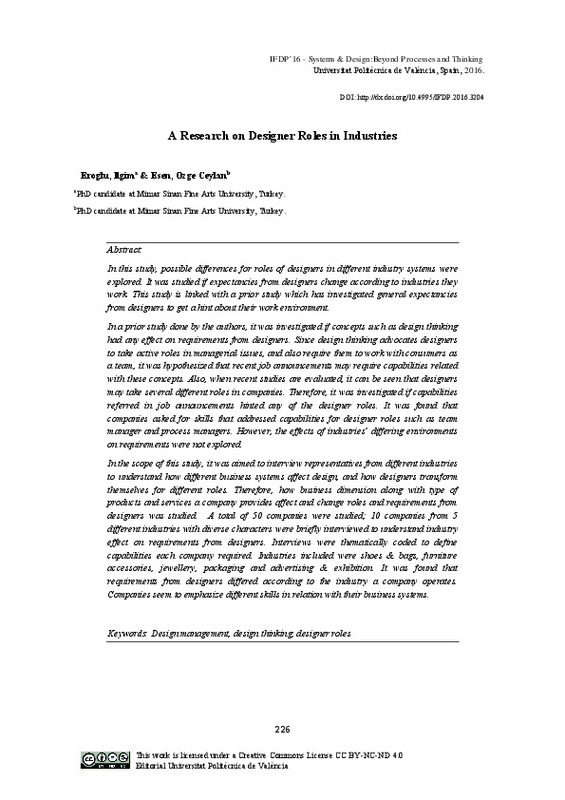JavaScript is disabled for your browser. Some features of this site may not work without it.
Buscar en RiuNet
Listar
Mi cuenta
Estadísticas
Ayuda RiuNet
Admin. UPV
A Research on Designer Roles in Industries
Mostrar el registro sencillo del ítem
Ficheros en el ítem
| dc.contributor.author | Eroglu, Ilgim
|
es_ES |
| dc.contributor.author | Ceylan Esen, Ozge
|
es_ES |
| dc.date.accessioned | 2017-09-20T06:58:43Z | |
| dc.date.available | 2017-09-20T06:58:43Z | |
| dc.date.issued | 2016-10-27 | |
| dc.identifier.isbn | 9788490484401 | |
| dc.identifier.uri | http://hdl.handle.net/10251/87564 | |
| dc.description.abstract | [EN] In this study, possible differences for roles of designers in different industry systems were explored. It was studied if expectancies from designers change according to industries they work. This study is linked with a prior study which has investigated general expectancies from designers to get a hint about their work environment. In a prior study done by the authors, it was investigated if concepts such as design thinking had any effect on requirements from designers. Since design thinking advocates designers to take active roles in managerial issues, and also require them to work with consumers as a team, it was hypothesized that recent job announcements may require capabilities related with these concepts. Also, when recent studies are evaluated, it can be seen that designers may take several different roles in companies. Therefore, it was investigated if capabilities referred in job announcements hinted any of the designer roles. It was found that companies asked for skills that addressed capabilities for designer roles such as team manager and process managers. However, the effects of industries’ differing environments on requirements were not explored. In the scope of this study, it was aimed to interview representatives from different industries to understand how different business systems affect design, and how designers transform themselves for different roles. Therefore, how business dimension along with type of products and services a company provides affect and change roles and requirements from designers was studied. A total of 50 companies were studied; 10 companies from 5 different industries with diverse characters were briefly interviewed to understand industry effect on requirements from designers. Interviews were thematically coded to define capabilities each company required. Industries included were shoes & bags, furniture accessories, jewellery, packaging and advertising & exhibition. It was found that requirements from designers differed according to the industry a company operates. Companies seem to emphasize different skills in relation with their business systems. | es_ES |
| dc.format.extent | 14 | es_ES |
| dc.language | Inglés | es_ES |
| dc.publisher | Editorial Universitat Politècnica de València | es_ES |
| dc.relation.ispartof | Systems&design:beyond processes and thinking | es_ES |
| dc.rights | Reconocimiento - No comercial - Sin obra derivada (by-nc-nd) | es_ES |
| dc.subject | Design management | es_ES |
| dc.subject | Design thinking | es_ES |
| dc.subject | Designer roles | es_ES |
| dc.title | A Research on Designer Roles in Industries | es_ES |
| dc.type | Capítulo de libro | es_ES |
| dc.type | Comunicación en congreso | es_ES |
| dc.identifier.doi | 10.4995/IFDP.2015.3204 | |
| dc.rights.accessRights | Abierto | es_ES |
| dc.description.bibliographicCitation | Eroglu, I.; Ceylan Esen, O. (2016). A Research on Designer Roles in Industries. En Systems&design:beyond processes and thinking. Editorial Universitat Politècnica de València. 226-239. https://doi.org/10.4995/IFDP.2015.3204 | es_ES |
| dc.description.accrualMethod | OCS | es_ES |
| dc.relation.conferencename | Systems & Design: Beyond Processes and Thinking | es_ES |
| dc.relation.conferencedate | June 22-24,2016 | es_ES |
| dc.relation.conferenceplace | Valencia | es_ES |
| dc.relation.publisherversion | http://ocs.editorial.upv.es/index.php/IFDP/IFDP/paper/view/3204 | es_ES |
| dc.description.upvformatpinicio | 226 | es_ES |
| dc.description.upvformatpfin | 239 | es_ES |
| dc.type.version | info:eu-repo/semantics/publishedVersion | es_ES |
| dc.relation.pasarela | OCS\3204 | es_ES |








